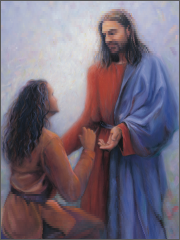
One thing I find amazing about this Gospel passage is that it almost didn’t make it into the Bible. In fact, before the canon of Scripture was finalized in the late 4th century, some versions of John’s Gospel didn’t include this story.
St. Augustine tells us (cf. De coniugiis adulterinis, 2, 6) that many early Christians were afraid of keeping this story in John’s Gospel since it showed Jesus as being so merciful that they thought it might lead people to think that the reality of sin wasn’t as serious as the Church made it out to be.
Apparently, the Holy Spirit wasn’t concerned about this, since He made sure the story was kept in there.
The story of the woman caught in adultery was the inspiration behind a post-abortion healing brochure [PDF] the League designed a few years ago. On the front is an image of Jesus and the woman, and the words “Neither do I condemn you.” On the back is information on where to find help dealing with post-abortion aftermath, and the message, “Please give this card to someone who needs it.”
We encourage sidewalk counselors to give these cards to women as they leave the abortion clinic, and we also pass them out during our Face the Truth demonstrations. They’ve become so popular that we now get orders for them (both the English and Spanish versions) from sidewalk counselors, pro-life groups, and post-abortion ministries all across the country.
It’s no coincidence that as more and more women continue to receive post-abortion healing and speak out publicly about their experiences, there is less and less support for abortion among the general population.
And even though pro-abortion groups continue to deny the reality of post-abortion aftermath, people are beginning to see what pro-aborts refuse to see.
The more we learn about the horrible pain and suffering experienced by women following an abortion (as well as men who are involved with abortion), and the relief they feel after receiving God’s forgiveness, the greater the need for us to offer them a helping hand.
